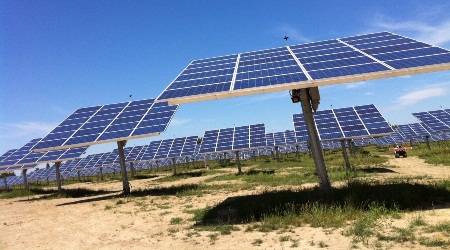Middlebury College of Vermont is a model for sustainable college campuses everywhere. Not only was the college the first school in the nation to offer an undergraduate degree in environmental studies, but it is also walking the walk. The college has set an aggressive goal to pursue energy conservation and efficiency, and develop renewable energy resources and technologies in an effort to become carbon-neutral by 2016.
Middlebury already has a wind turbine and a biomass plant; and its 2011 Solar Decathlon house, “Self-Reliance” is now a campus living quarters. This spring, Middlebury College will take the idea of self-reliance even further by installing a campus solar farm.
The college has signed an agreement with Williston-based AllEarth Renewables (AER) to install 34 solar trackers on about 1.5 acres of college land. The facility will produce an average of 200,000 kilowatt-hours (kWh) per year—enough to power one of the college’s residence halls that houses about 238 students. Based on current and projected electric rates, the system is expected to save the college about $5,000-$10,000 a year.

The facility will not be the first solar energy system installed at Middlebury. The school already installed solar panels on its LEED-Platinum Franklin Environmental Center in 2008, and on Farrell House in 2003. However, the new facility will be much larger—producing about 15 times the power of the existing systems. In addition, the new system will use AER’s locally-manufactured AllSun Trackers, which uses GPS and wireless technology to follow the sun throughout the course of the day.
According to David Blittersdorf, CEO and founder of AER, the pole-mounted solar trackers produce over 40 percent more energy than solar panels mounted at a fixed tilt angle. In addition, the trackers are assembled AER’s Williston facility, using many components made in Vermont. The technology was used in last year’s 2.2-megawatt (MW) solar farm installation in Burlington–the largest solar energy facility in the state.

The idea for the project originated from a report written by students in a 2010 Environmental Economics class. The report, entitled, “The Cost-Benefit Analysis of a proposed Small Scale Solar Farm at Middlebury College”, found many positive economic and social impacts in a potential partnership between Middlebury and AER. A Middlebury graduate and AER employee heard about the student interest, and spoke with administrators about constructing a solar farm in 2011.
Weybridge-based Backspin Renewables will begin construction on the project in February, and the facility is expected to be complete this spring.
“We’re excited to have this system to explore the potential for additional solar power in the future,” said Jack Byrne, Middlebury College director of sustainability integration. “This is a demonstration project that offers an opportunity for student learning and research as well as one more option to explore as we pursue our goal to become carbon neutral by 2016. Staff will also have the chance to gain an understanding of the operational aspects of a solar energy system.”